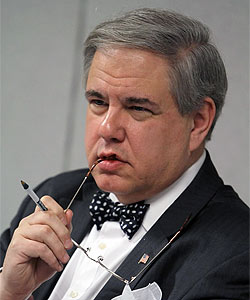
Joseph Morris Rahm Emanuel took the stand this morning in a hearing to determine whether he meets the residency requirements to run for mayor, given that he has been living in D.C. for the last two years. The hearings, held at the Loop offices of the Chicago Board of Election Commissioners, have been something of a spectacle, with crowds of objectors swarming the tiny basement conference room, shouting “indict Rahm”—or worse.
Presiding over the three-ring circus has been hearing officer Joseph Morris, a 59-year-old lawyer and conservative activist donning a bow tie. Born and reared in Gary, Indiana, Morris has his A.B. and J.D. degrees from the University of Chicago. He’s a true-red Republican with a talent for expressing his opinions on air—a former co-host on WBEZ’s Equal Time, a frequent guest on Milt Rosenberg’s WGN Extension 720, and on WTTW’s Chicago Tonight during the John Callaway years. A close friend of the late Sun-Times columnist Irv Kupcinet, Morris made scores of appearances in Kup’s Column over the years. (An example from June 1, 1997: “The latest issue of Illinois Politics names Joe Morris ‘Mr. Conservative’ and the recognized leader of conservatism in the state.”)
After college, Morris worked as an editor of the right-wing American Spectator. Over the years, he has held leadership positions in the GOP, including president of the United Republican Fund Illinois. He held several positions in the Reagan administration, and continues to head the staunchly conservative Lincoln Legal Foundation—“individual liberties, limited, constitutional government.” He is also on the board of advisers of the conservative Federalist Society. Morris has also headed the Midwest region of the B’nai B’rith. (His Who’s Who entry carries two affiliations seldom seen on the same line: “Republican Jewish.”)
He has a law firm in Chicago, Morris & De La Rosa, but it is really a two-man shop—his partner is a barrister practicing in London, and Morris has traveled the world plying his trade.
That’s the part that goes in the résumé.
In August 1994, while running against John Stroger for President of the County Board, he was sued by Roland Burris, then the state’s attorney general. Burris sued Morris and the Lincoln Legal Foundation for inconsistencies in accounting of the Foundation’s finances. Morris denounced the suit as a “politically motivated” stunt designed to hurt him and help Stroger. Morris had previously resigned as CEO of the Mid-America Legal Foundation, a conservative think tank, after others in the organization complained publicly that he had spent the group into debt with lavish expenditures for office space, decorating and travel. He denied any improprieties.
More recently, in 2005, Morris was disciplined by the Executive Office for Immigration Review (a part of the U.S. Department of Justice), charged with “violations of the Rules of Professional Conduct for immigration practitioners.” He was not suspended from the practice of law; instead he was issued a “public censure” for “conduct amounting to ineffective assistance of counsel.”
Morris has worked from time to time as a hearing officer for the Board of Elections—an appointed position—since the early 1990s.
His plan is to wrap up the hearing on Thursday, and then he will consider the testimony and write his recommendation on whether Rahm’s name should stay on the ballot. He will submit it to the Chicago Board of Election Commissioners, which will decide whether or not to accept it. The board’s decision will likely be appealed—first stop the Circuit Court of Cook County—perhaps up to the Illinois Supreme Court.
Time is tight. Early voting begins on January 31st for the February 22nd nonpartisan primary, so the ballots—with or without Rahm’s name—have to be printed and ready to go.
Bruce DuMont, host of the nationally syndicated radio show Beyond the Beltway, calls Morris, who has appeared on the show, “very conservative.” Can Morris be fair to Rahm, a man who is known as the most partisan of Democrats? Dumont says yes, adding that Morris, in addition to being fair, is “really sharp, smart, and articulate.”
Chris Robling—a Republican strategist, media personality, PR man, and a member of the Chicago Board of Election Commissioners from 1991 to 1994—told me that he brought Morris “into the system when I was a commissioner. He has done a good job ever since, or he wouldn’t still be there.” Like DuMont, Robling praises Morris as “a really brilliant lawyer” and a “Renaissance man.” He promises that Morris will deliver “a very serious interpretation, application of the law to the facts that come out in the evidentiary hearing. He’s not in there for Rahm or for Gery Chico; he’ll play it straight.”
Then again, there’s not a Republican in the race, unless you count the Rev. James Meeks. Plus, the election lawyer, Burt Odelson, who is taking the lead in trying to knock Rahm off the ballot—and who is reportedly representing Meeks—did work the Bush side in the 2000 Gore/Bush recount in Florida.
Photograph: Chicago Tribune/Abel Uribe


